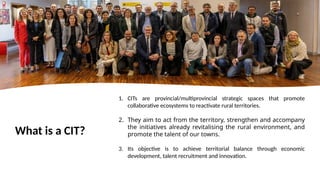OECD Rural Principles series: Taking an integrated approach to Rural Development ŌĆō M.M. P├®rez.
- 2. What is a CIT? 1. CITs are provincial/multiprovincial strategic spaces that promote collaborative ecosystems to reactivate rural territories. 2. They aim to act from the territory, strengthen and accompany the initiatives already revitalising the rural environment, and promote the talent of our towns. 3. Its objective is to achieve territorial balance through economic development, talent recruitment and innovation.
- 3. TERRITORIAL INNOVATION CIT and Demographic Challenge ŌĆóCITs are part of the strategic plan of the General Secretariat for the Demographic Challenge to face depopulation. ŌĆóThey are an instrument within the 130 measures of the National Plan to Address the Demographic Challenge, aligned with the Recovery, Transformation, and Resilience Plan. ŌĆóAxis 3 of this Plan, Development and Innovation of the Territory, addresses the development of a network of territorial innovation centres. ŌĆóThe objectives are to improve the country's territorial cohesion, eliminate the urban/rural divide, and promote action in the areas most affected by inequality.
- 4. CITsŌĆÖ Map: location There are currently 11 Centres: ŌĆó Asturias ŌĆó Badajoz ŌĆó C├Īceres ŌĆó Cuenca ŌĆó Huesca ŌĆó Ja├®n ŌĆó Le├│n ŌĆó Lleida-Comarcas Pirenaicas ŌĆó Soria ŌĆó Teruel ŌĆó Val dŌĆÖAran ’üČ CITs are located in strategic areas with a risk of depopulation, with less than 5000 inhabitants per square kilometre. ’üČ Other territories will soon be incorporated into this network.
- 5. What do we want to achieve? Enhance existing projects Implement innovative initiatives ’üČ Reinforce a concept of rurality based on collaboration, collective intelligence and social innovation Objectives: Energising the rural socio-economic fabric Work for demographic challenges, supporting existing agents in the territory Improving the quality of life Retaining and attracting talent Developing entrepreneurship ’āś Seeking territorial balance
- 6. How are CITs organized? ŌĆó The core of the CIT strategy is people and their relationships. The idea is to work together collaboratively to revitalise the territories that are being depopulated. ŌĆó The organisation is horizontal and inclusive. Local public entities, civil society actors and business associations participate. ŌĆó The focus is strengthening relationships and teamwork to energise rural territories.
- 7. CITsŌĆÖ Network RedCIT 's Coordinating Node began operating in July 2024. Its task is to connect each of the provincial Innovation Centers. This coordination office depends on the General Secretariat for the Demographic Challenge. It is located in Ponferrada, Le├│n. Its objectives are: ’āś dynamise, coordinate and promote these innovative projects ’āś encourage the creation of synergies between the different territorial centres ’āś be a facilitator of the exchange of good practices and successful experiences ’āś promote collective innovation and transformation solutions to activate sustainable economic development throughout the territory.
- 8. NETWORK Structure RedCIT and its Main Node Office operate on two levels. First, the node reinforces the coordination of initiatives and communication between each of the provincial CITs. Second, the General Secretariat for the Demographic Challenge catalyses the various initiatives launched by the different ministries to face the demographic challenge. Coordination Catalyst for Initiatives Digital Platform: Facilitates network collaboration and governance: www.redcit.es ŌĆó Objective: To promote connectivity, visibility and appreciation of rural life in Spain.
- 9. Where do we get more information? "State Policy for the Demographic Challenge": https://www.miteco.gob.es/en/reto-demografico/temas/politica-estado.html "Plan of 130 measures against the Demographic Challenge":https://www.miteco.gob.es/en/reto-demografico/temas/medidas -reto-demografico.html Francisco Boya Al├│s, ŌĆ£PrologueŌĆØ, in Vega N├║├▒ez, Jorge, Calvo Gonz├Īlez, Jos├® L, Econom├Ła y desarrollo territorial sostenible, Madrid: Dykinson, 2024. Iv├Īn del Caz, ŌĆ£Territorial Innovation Centers Implementation GuideŌĆØ, General Secretariat for the Demographic Challenge, Ministry for the Ecological Transition and the Demographic Challenge. ŌĆ£Declaration of Somiedo on Territorial Innovation in Rural AreasŌĆØ, February 10th, 2023, https://readerasturias.org/sites/default/files/reader/DOCUMENTOS/2024%2 0READER/230210_Definitiva_Declaraci%C3%B3n_Somiedo_Innovaci%C3%B3 n_Territorial.pdf
- 10. citmitecociuden@ciuden.com Thank you for your attention Contact: mdmartos@miteco.es
Editor's Notes
- #2: Welcome A warm welcome to all attendees. Purpose of the presentation: In this presentation, we want to briefly present the strategic objectives of the Territorial Innovation Centres (CIT)










